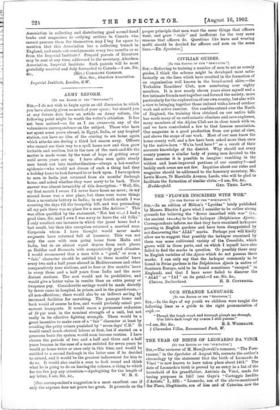ARMY REFORM.
[To THE EDTIOR OP THE .• scccrAzos."1 do not wish to begin again an old discussion to which you have already given so much of your space ; but should you at any future date have an article on Army reform, the following point might be worth the writer's attention. It has not been noticed—so far as I am aware—in any of the voluminous correspondence on the subject. Those who have not spent some years abroad, in Egypt, India, or any tropical station, can have no idea of the craving to see home again which attacks one during a third hot season away. Officers who cannot see their way to a spell home now and then grow irritable and restless, but in the case of the rank-and-file the matter is made worse by the want of hope of getting away until seven years are up. I have often seen quite steady men break out into insubordination—always a hot-weather epidemic—who would not dream of such a thing had they a holiday home to look forward to or back upon. I have spoken to men in India just returned from six months' furlough home, and asked whether they were sorry to be back. Their answer was almost invariably of this description: " Well, Sir, my first month I swore I'd never leave home no more ; in my second home was a nice place, but there were worse things than a mountain battery in India; in my fourth month I was counting the days till the troopship left, and was persuading all my pals there was no place for a man like Ashinee." This was often qualified by the statement, "Not but wLat I had a good time, Sir, and I own I was sorry to leave the old folks." I only recollect one instance in which the jaunt home had a bad result, but then this exception returned a married man. Corporals whom I have thought would never make sergeants have returned full of keenness. This was not only the case with men going home from Malta and India, but in an almost equal degree from such places as Halifax and Bermuda with comparatively good climates. I would recommend that a man with a " good," or even a "fair," character should be entitled to three months' leave every two and a half years abroad in Mediterranean and other comparatively near stations, and to four or five months' leave in every three and a half years from India and the more distant stations. The cost would not be prohibitive, and would give a better value in results than an extra penny or twopence pay. Considerable savings would be made directly by fewer cases in hospital, in prison, and in the guard-room,- all non-effectives ; there would also be an indirect saving by increased facilities for recruiting. The passage home and back would of course be free, and would probably entail per- manent transports. It would mean a permanent reduction of 10 per cent. in the nominal strength of a unit, but not really in its effective fighting strength. There would be a great incentive to make sure of a " fair " character at least by avoiding the petty crimes punished by " seven days' C.B." It would entail much clerical labour at first, but if started on a generous basis the system would soon become routine. I have chosen the periods of two and a half and three and a half years because in the case of a man enlisted for seven years be would go home twice or once only in this time, and would be entitled to a second furlough in the latter case if he decided to extend, and it would be the greatest inducement for him to do so. It would also enable a man to look round and think what he is going to do on leaving the colours, a thing to which far too few pay any attention.—Apologising for the length of
[Our correspondent's suggestion is a most excellent one if only the expense does not prove too great. It proceeds on the
proper principle that men want the same things that officers want, and grow " stale" and inefficient for the very same reasons that officers do. Questions like leave and wearing mufti should be decided for officers and men on the same lines.—ED. Spectator.]


































 Previous page
Previous page